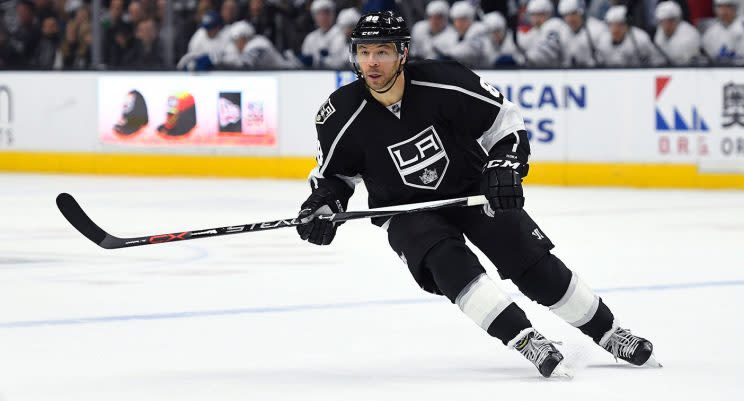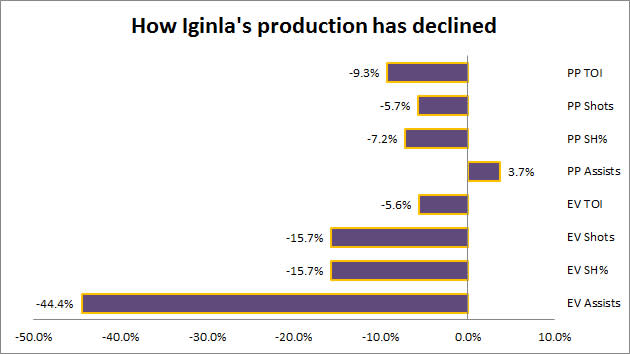Can Iginla recapture his former glory with Kings?

In 2013, the Calgary Flames made a tough decision and dealt Jarome Iginla at the NHL trade deadline. The deal netted the Flames two prospects and a first-round pick and was a pretty good haul for a 35-year-old rental player, though a relatively pitiable one given how important Iginla had been to the franchise over his career.
On Wednesday, the same player was dealt by Colorado to Los Angeles in exchange for a fourth-round pick. The conditions on that pick are such that barring a playoff appearance by the Kings or a contract extension with Iginla, the Avs may end up with nothing at all.
Four years is a long time in hockey, and especially so for a player on the wrong side of 35. Iginla had nine goals and 22 points in 2013, but that was a lockout year. He had just eight goals and 18 points through nearly double the number of games this season.
Los Angeles didn’t trade for the 2013 version of Iginla, but it also didn’t take on his salary and risk a draft pick for the edition of the player we’ve seen this season. The Kings are taking a calculated risk that Iginla has more to offer than he showed the Avalanche this season. They may well be right.
Before we get into the analytics perspective, it’s worth identifying some common sense factors. The first is the coach. The second, related, item is the system.
Iginla and Darryl Sutter have common history in Calgary, including the Flames’ run to the Stanley Cup Final in 2004. Sutter’s team in Los Angeles plays a game predicated on possession in the offensive zone, primarily by way of strength and brains rather than speed. There isn’t another team in hockey with a combination of coach and system better-suited to bring out the most in Iginla.
Linemates will help, too. In Denver, Iginla’s most common centre was John Mitchell, he of four points through 54 games. When the Kings played Toronto on Thursday, Iginla played on Anze Kopitar’s line. If he fails in L.A., it won’t be for lack of help.
Even with all that in his favour, Iginla won’t be winning the Art Ross this season. What he just might be able to do is get back to his Colorado averages prior to this season: 25-ish goals, 50-ish points. If he does, the Kings will have invested wisely. It’s worth looking at why he isn’t at that pace now to determine whether such a recovery is possible.
Iginla’s scoring pace is down to less than half of his average of the last two years, and we can break that down into eight distinct areas:

Ice time in all situations is a relatively small portion of the problem, accounting for under 15 percent of the overall drop. The power play isn’t really to blame; Iginla’s assists are actually up a bit and while both shots and shooting percentage are down it’s not a big chunk of his disappearing points.
The big drops are at even strength. Iginla shoots less. When he shoots, he’s less likely to score. His assist totals have crumbled.
The shooting percentage number should surely be considered with skepticism. While it’s certainly true that older players tend to see their shooting percentage fall away over time, Iginla essentially went from firing at his career average a year ago to half of that this season. That’s such a collapse that it most likely stems from a variety of factors, only one of which is age.
One of those factors is linemates, and here it’s helpful to look at Iginla’s assist totals. A player can earn an assist as either the primary passer on a goal or as the secondary passer. Some teams look solely at primary assists because there is less randomness to them — which player on the ice earns a second assist is often a matter of chance.
This year, 82 percent of Iginla’s assists are primary assists. A year ago, that number was 66 percent. In other words, if Iginla isn’t actively setting up a goal or scoring it himself, he almost certainly isn’t getting a point. That can be a result of chance, or of linemates who just aren’t doing much for themselves. In this case, it’s likely both.
Neither we nor the Kings can say with certainty how Iginla is going to respond to playing in Los Angeles, but from here the team’s gamble looks like a smart one. Iginla isn’t the player he once was, and he’s going to continue slowly deteriorating, but it certainly looks like much of his problem this year was the result of playing with bad linemates on a miserable hockey team.
If that’s true, the Kings just added a useful veteran for almost nothing.


